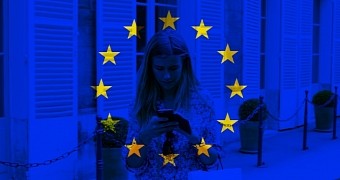A recently voted amendment to the European General Data Protection Regulation would prohibit companies from handling the data of a child under 16. Previously, the threshold was the age of 13.
The European General Data Protection Regulation (EGDPR) is an EU law introduced in January 2012 as a way for the European Parliament to control and regulate the EU cyberspace.
One of its provisions was that companies would be forbidden to ask, store, and handle the private details (data acquired in sign-up registrations) from kids who were 13 and younger.
All companies that want to handle children information or target a children userbase need to obtain consent from one of the parents. This is usually done by also requiring personal data from the parent at sign-up or via dual parent-kid accounts.
Teens under 16 will need parental consent to register on social media
At the end of November, an amendment was proposed to the EGDPR, containing eight new clauses, one of which would have the age at which children need consent from a parent moved to 16.
Inside sources like Janice Richardson, former coordinator of European Safer Internet network, and consultant to the United Nations' Information Technology Body, the ITU, and the Council of Europe, say that this provision was specifically added to make it hard for teenagers to sign up on social media.
EU regulators think that, by limiting access to social media and other online services, they can keep kids safe from online abuse, pedophiles, and personal information leakage via data breaches. Legislators also believe that, by taking away distractions, children will also focus more on their education.
The new law didn't specifically prohibit teenagers from signing up for social media but made it harder by requiring parental consent, which many parents will not be willing to give.
Amendments voted without a period of public debate
Mrs. Richardson has been quick to point out that social media has also been used by teenagers to ask for support in suicide attempts, would alienate teens in their groups if some kids could not register for accounts, would hinder sign-ups for legitimate educational services, and would also incentivize children to begin lying about their age.
The amendments for the new EGDPR were submitted for voting to the Permanent Representatives Committee in the European Parliament on December 15, and were approved on December 18. The new EGDPR revisions were voted without a period of public debate.
To become official, the new amendments will now need to be ratified by the Council and the Parliament in early January 2016.
According to the new EGDPR version, individual countries will still have the power to lower the parental consent to the old threshold if they wish to.

 14 DAY TRIAL //
14 DAY TRIAL //